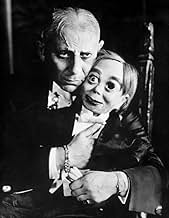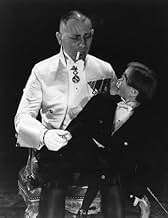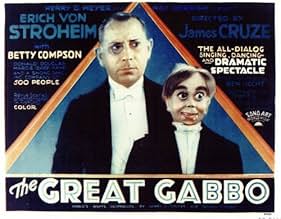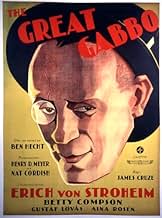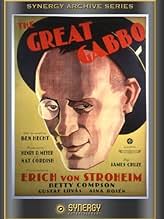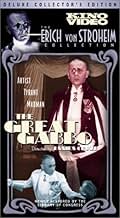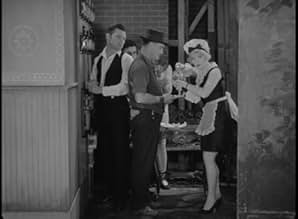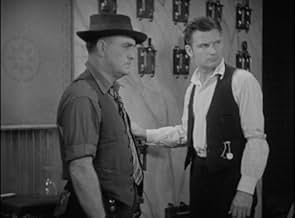NOTE IMDb
6,0/10
1,1 k
MA NOTE
Ajouter une intrigue dans votre langueAn insanely, egocentric ventriloquist, even though he is possessed by his wooden dummy, is in love with a dancer who is in love with another. The dummy gives advice to the ventriloquist.An insanely, egocentric ventriloquist, even though he is possessed by his wooden dummy, is in love with a dancer who is in love with another. The dummy gives advice to the ventriloquist.An insanely, egocentric ventriloquist, even though he is possessed by his wooden dummy, is in love with a dancer who is in love with another. The dummy gives advice to the ventriloquist.
- Réalisation
- Scénario
- Casting principal
Erich von Stroheim
- The Great Gabbo
- (as Eric Von Stroheim)
Marjorie Kane
- Babe
- (as Margie 'Babe' Kane)
George Grandee
- Otto
- (voix)
- (non crédité)
Bo Peep Karlin
- Dancer
- (non crédité)
Rosina Lawrence
- Dancer
- (non crédité)
Harry Ross
- Performer
- (non crédité)
Eddy Waller
- Vaudevillian
- (non crédité)
Marbeth Wright
- Dancer
- (non crédité)
Avis à la une
This film about a ventriloquist who lives a self-imposed life of lonliness because of his personality is absorbing, different, and dated. Shortly produced after The Jazz Singer(1927), the film is an early talkie with all the characteristics of an early talkie. It has somewhat stilted stages, little camera movement, and most annoying, a bunch of Busby Berkley type musical numbers that have little to do with the plot. All that notwithstanding, the lead role of Gabbo, a man who lives to be successful no matter what it takes, who is willing to forsake personal happiness to achieve, who runs the scope of emotions in minutes, is played with gusto by that wonderful actor(and even greater director) Erich Von Stroheim. Von Stroheim uses all his European charm(and decadence) as the man who shares life and lives with and through his dummy Otto. There are no supernatural aspects about the relationship with Gabbo and Otto. The movie is in no way a horror picture(although very often advertised as such). It really is a story of the problems a man has exhibiting his emotions, living with others, and living with himself. Some of the scenes are very well-done, including the last shot as we see Gabbo avoid a ladder. The rest of the cast is effective with Betty Compson as a love interest doing a fine job, and Donald Douglas as a lead singer/romantic figure being absolutely absurd. If for no other reason, see the film to see Von Stroheim in action. There was no one like him.
Clunky solid gramophone sound and some sensational Ziegfeld stage numbers make this early talkie musical drama a real treat for viewers forgiving of 1929 movies. Vile schizophrenic ventriloquist brute, Von Stroheim, with his very creepy dummy (like the terrifying one in the DEAD OF NIGHT sequence with Michael Redgrave) seem somehow to be the toast of the stage. This 1929 showcase for both the technology of the day and the stage and screen stars rightly celebrated over the period are shown to be both fascinating and versatile as this film progresses. Other comments on this site will tell you the story and some criticize it's 1929 limits, but really THE GREAT GABBO is an excellent film of its day that rightly and clearly shows the force of Von Stroheim and the expert stage and screen dance entertainment popular in the 20s in the Ziegfeld sequences seemingly filmed right in front of a real stage. If you have seen THE BOYFRIEND the 1970 Ken Russell comedy you will get an idea of how fabulous THE GREAT GABBO must have looked in color. Most of the massive stage scenes are pale in my B/W copy and clearly are those sequences in Multicolour which the opening credits alert us to (be missing). Betty Boop sister Majorie Kane appears and most of the musical numbers are hilariously delightful, crowded with teens leaping about and bumping into each other in a great array of all sorts of fantasy costumes. The silliest and most enjoyable of which is a spider and fly number in which the above quote is hissed during a squabble in between verses. THE GREAT GABBO is a major find for students of 20s art deco, early talkie technology and very strong and effective acting. Von Stroheim must have been such a pain to Hollywood, a brute on screen and off. This film is full of wow! scenes. Highly recommended for anyone wanting further insight into the era. Other films worth seeing that add to the experience are GLORIFYING THE American GIRL, and THE 1929 SHOW OF SHOWS. The sound on my DVD copy is very good.
THE GREAT GABBO (Sono-Art, 1929), directed by James Cruze, adapted from the story "The Rival Dummy" by Ben Hecht, stars famed director and actor Erich Von Stroheim in his talkie debut as an egotistical ventriloquist named Gabbo, or should I say, THE GREAAAT GABBO. He not only performs on stage with his dummy, Otto, (Gabbo's better half) but talks to it in his dressing room, on the street and in restaurants, with the dummy himself talking back to him, especially when Gabbo is drinking water, eating or smoking a cigarette. He has an assistant named Mary (Betty Compson), with whom he constantly finds fault in her efforts. ("My coffee is too cold/ My coffee is too hot!" etc.) During one performance she accidentally stumbles and drops a tray, which infuriates him to criticize her action, causing her to walk out on him. As time passes, Gabbo increases his fame by becoming a featured headliner in the Manhattan Revue where Mary now performs as a singer and dancer along with her new partner named Frank (Donald Douglas). In spite that he is more conceited than ever, Gabbo decides he wants Mary back with him, but something happens that will cause Gabbo to go completely insane in a dramatic climax that disrupts the show.
Aside from long stretches of dialog and no underscoring, a common practice in early talkies, "The Great Gabbo," though not considered a musical, has its share of production numbers. What makes this 1929 movie stand out among other musicals at that time is that the orchestration during the stage numbers doesn't sound at all like the usual 1920s score but more-so something from the Ziegfeld Follies. The choreography, compliments by Maurice L. Kusell, unfortunately, does not have the creativity of a Busby Berkeley, for that mainly the girls on stage simply walk back and forth carrying umbrellas, do some dancing and ballet, but there are never any closeups and the camera seldom moves or intercuts, making some of the eight to ten minute production numbers appear to be a little longer than its time length. The tunes itself, however, aren't really bad to listen to, although none of them became popular on the Hit Parade. The opening credits listing mentions sequences in Multicolor, but the entire movie itself can be seen today only in black and white.
The songs (By Paul Titsworth, Lynn Cowan, Don McNamee and King Zany) from the existing film print include: "I'm Laughing" and "The Lollipop Song-Ickey" (both sung by Otto); "Every Now and Then" (sung by Marjorie Kane and Donald Douglas); "I'm in Love With You" (sung by Douglas and Betty Compson); "The New Step" (sung by Kane); "Caught in the Web of Love" (sung by Douglas and Compton/ chorus); "I'm in Love With You" (dance number); and a finale that includes a montage of dance numbers, including the cut number of "The Ga-Ga Bird" which is shown briefly. Of all the songs, only "Caught in the Web of Love" has a slow score, but a production number that sets Douglas and Compton as human spiders dancing in front of a giant spider web. "I'm in Love With You" is one of the better songs presented in the movie, that would be sometimes edited out from some TV prints. Marjorie "Babe" Kane (famous for her role as WC Fields' daughter in the comedy short THE DENTIST in 1932) supplies some comedy, songs and taps.
THE GREAT GABBO is Von Stroheim's show all the way, monocle and all, but not the voice that accompanies his dummy, Otto. In spite of slow spots, it's an interesting drama, original in theme and premise. One wonders if Rod Serling, host of TV's "The Twilight Zone" of the 1960s, had seen this movie, since there is an episode that I recall that involves a performer obsessed by his dummy and having conversations with it, for which the dummy runs and later ruins his life and career.
I last saw THE GREAT GABBO on Cable TV's The Nostalgia Channel in the early 1990s, and it used to be one of the movies shown on Public Television's SPROCKETS back in the early 1980s. This rarely seen antique, a real curio at best, can be found on video cassette through various distributors. For a best VHS or DVD print with clearer picture and sound quality, with restored opening and exit music (but minus the reported color sequences), the best recommendation is to obtain a copy from the KINO Video Company. (**)
Aside from long stretches of dialog and no underscoring, a common practice in early talkies, "The Great Gabbo," though not considered a musical, has its share of production numbers. What makes this 1929 movie stand out among other musicals at that time is that the orchestration during the stage numbers doesn't sound at all like the usual 1920s score but more-so something from the Ziegfeld Follies. The choreography, compliments by Maurice L. Kusell, unfortunately, does not have the creativity of a Busby Berkeley, for that mainly the girls on stage simply walk back and forth carrying umbrellas, do some dancing and ballet, but there are never any closeups and the camera seldom moves or intercuts, making some of the eight to ten minute production numbers appear to be a little longer than its time length. The tunes itself, however, aren't really bad to listen to, although none of them became popular on the Hit Parade. The opening credits listing mentions sequences in Multicolor, but the entire movie itself can be seen today only in black and white.
The songs (By Paul Titsworth, Lynn Cowan, Don McNamee and King Zany) from the existing film print include: "I'm Laughing" and "The Lollipop Song-Ickey" (both sung by Otto); "Every Now and Then" (sung by Marjorie Kane and Donald Douglas); "I'm in Love With You" (sung by Douglas and Betty Compson); "The New Step" (sung by Kane); "Caught in the Web of Love" (sung by Douglas and Compton/ chorus); "I'm in Love With You" (dance number); and a finale that includes a montage of dance numbers, including the cut number of "The Ga-Ga Bird" which is shown briefly. Of all the songs, only "Caught in the Web of Love" has a slow score, but a production number that sets Douglas and Compton as human spiders dancing in front of a giant spider web. "I'm in Love With You" is one of the better songs presented in the movie, that would be sometimes edited out from some TV prints. Marjorie "Babe" Kane (famous for her role as WC Fields' daughter in the comedy short THE DENTIST in 1932) supplies some comedy, songs and taps.
THE GREAT GABBO is Von Stroheim's show all the way, monocle and all, but not the voice that accompanies his dummy, Otto. In spite of slow spots, it's an interesting drama, original in theme and premise. One wonders if Rod Serling, host of TV's "The Twilight Zone" of the 1960s, had seen this movie, since there is an episode that I recall that involves a performer obsessed by his dummy and having conversations with it, for which the dummy runs and later ruins his life and career.
I last saw THE GREAT GABBO on Cable TV's The Nostalgia Channel in the early 1990s, and it used to be one of the movies shown on Public Television's SPROCKETS back in the early 1980s. This rarely seen antique, a real curio at best, can be found on video cassette through various distributors. For a best VHS or DVD print with clearer picture and sound quality, with restored opening and exit music (but minus the reported color sequences), the best recommendation is to obtain a copy from the KINO Video Company. (**)
As director and actor Erich Von Stroheim did some very weird films and The Great Gabbo is certainly one of them. In this Von Stroheim is a star attraction in a Ziegfeld Follies type stage review and he is fixated on Betty Compson who used to be his assistant in his act, but walked out on him because he treated her shabbily.
Now she is keeping company with Donald Douglas a young hoofer in the show. He's actually upset as well with her interest in Von Stroheim.
In a way it's hard to review this because just the name of Erich Von Stroheim brings up images of barbaric cruelty show on the screen. The name alone is sufficient to conjure up horrible images.
So Von Stroheim wants to set up house with her and his dummy Otto. As in most ventriloquist stories the dummy functions as an alter ego.
All this with the backdrop of a Ziegfeld type show. That was interesting and like Glorifying The American Girl, The Great Gabbo is a nice filmed record of what these shows were like on stage.
Although Von Stroheim is always interesting, The Great Gabbo's best value is as a record of the type musical revue so popular back then.
Now she is keeping company with Donald Douglas a young hoofer in the show. He's actually upset as well with her interest in Von Stroheim.
In a way it's hard to review this because just the name of Erich Von Stroheim brings up images of barbaric cruelty show on the screen. The name alone is sufficient to conjure up horrible images.
So Von Stroheim wants to set up house with her and his dummy Otto. As in most ventriloquist stories the dummy functions as an alter ego.
All this with the backdrop of a Ziegfeld type show. That was interesting and like Glorifying The American Girl, The Great Gabbo is a nice filmed record of what these shows were like on stage.
Although Von Stroheim is always interesting, The Great Gabbo's best value is as a record of the type musical revue so popular back then.
Once again I am dumbfounded at how a great movie can get such a low rating on IMDb. All I can guess is that most of the voters were expecting to see a Gene Kelly-type musical. If this describes you, then leave now. "The Great Gabbo" is about as ANTI-musical as a musical can get. It is a heavy, ponderous, gripping story with more drama than Francis Ford Coppola could ever eke out of a reel of film. It is a compelling and surprisingly complex journey into the mind of a bizarre man.
This is the story of a misunderstood artist whose canvas is a puppet. But whereas the stereotypical story of the misunderstood artist depicts the protagonist as a static character, Gabbo is a highly dynamic individual who keeps us guessing throughout. Is he a good man? Is he a bad man? Is he sane? Is he mad? These questions are not answered until the spectacular & powerful finale, and even then there is much room for speculation.
(As an aside to you Kurosawa fans, the structure of this film is much like Kurosawa's 1952 classic "Ikiru", at times slow but building up to a powerful and unforgettable finish. And the final image deserves its place in the Louvre.)
Regardless of if you're prepared for this type of experience, one thing is for sure: the amazing performance of Erich von Stroheim will burn itself into your mind forever. This film, being one of the early talkies, does not mix much dialogue and music. That is, the spoken scenes are done in silence with no music underneath (much like the 1931 Fritz Lang masterpiece "M"). This means that the actors must carry the entire scene on their shoulders, like in the old days of Shakespearian soliloquies. Erich von Stroheim rises to the challenge in this minimalist setting, and HE DELIVERS. In some scenes he makes you hate him. In others you love him. He can elicit pity as well as admiration. What a roller-coaster ride! Pitted against the heavy drama, the musical numbers seem jarring and incongruous at first. But on further reflection we realize that this emphasizes the bipolar, schizophrenic nature of the subject. Just like Gabbo, a man divided between two worlds, this film divides itself between Broadway musical and psychological thriller. This movie was at least 80 years ahead of its time, if not more.
That's all I'll say because the rest is best experienced as a surprise. This is the best film I've seen in a long time, and the only reason why I'm rating it an 8 instead of a 10 is that, sadly, the original colour scenes were lost, and some of the scenes are in need of restoration on my DVD copy. We can only dream of what it was like to see "The Great Gabbo" as it was originally shown in 1929.
This is the story of a misunderstood artist whose canvas is a puppet. But whereas the stereotypical story of the misunderstood artist depicts the protagonist as a static character, Gabbo is a highly dynamic individual who keeps us guessing throughout. Is he a good man? Is he a bad man? Is he sane? Is he mad? These questions are not answered until the spectacular & powerful finale, and even then there is much room for speculation.
(As an aside to you Kurosawa fans, the structure of this film is much like Kurosawa's 1952 classic "Ikiru", at times slow but building up to a powerful and unforgettable finish. And the final image deserves its place in the Louvre.)
Regardless of if you're prepared for this type of experience, one thing is for sure: the amazing performance of Erich von Stroheim will burn itself into your mind forever. This film, being one of the early talkies, does not mix much dialogue and music. That is, the spoken scenes are done in silence with no music underneath (much like the 1931 Fritz Lang masterpiece "M"). This means that the actors must carry the entire scene on their shoulders, like in the old days of Shakespearian soliloquies. Erich von Stroheim rises to the challenge in this minimalist setting, and HE DELIVERS. In some scenes he makes you hate him. In others you love him. He can elicit pity as well as admiration. What a roller-coaster ride! Pitted against the heavy drama, the musical numbers seem jarring and incongruous at first. But on further reflection we realize that this emphasizes the bipolar, schizophrenic nature of the subject. Just like Gabbo, a man divided between two worlds, this film divides itself between Broadway musical and psychological thriller. This movie was at least 80 years ahead of its time, if not more.
That's all I'll say because the rest is best experienced as a surprise. This is the best film I've seen in a long time, and the only reason why I'm rating it an 8 instead of a 10 is that, sadly, the original colour scenes were lost, and some of the scenes are in need of restoration on my DVD copy. We can only dream of what it was like to see "The Great Gabbo" as it was originally shown in 1929.
Le saviez-vous
- AnecdotesThe dummy Otto was a hand carved basswood Frank Marshall figure. The same man who designed Edgar Bergen's famous characters Charlie McCarthy and Mortimer Snerd.
- GaffesOverlooking the seeming impossibility of Gabbo having Otto the Dummy speak while Gabbo is eating, smoking, and drinking, Otto's head and mouth move with the words and music when Gabbo is at least six feet away.
- Versions alternativesGabbo le ventriloque (1929) was originally released by Sono Art-World Wide Pictures, with certain sequences were presented in Multicolor. However, current prints, restored by the Library of Congress and released by Kino International on DVD, exist only in black-and-white. Most, perhaps all, VHS and DVD releases of the film have the color sequences in black and white.
- ConnexionsEdited into The Girl from Calgary (1932)
- Bandes originalesEvery Now and Then
(uncredited)
Written by King Zany and Donald McNamee
Performed by Marjorie Kane and Donald Douglas
Meilleurs choix
Connectez-vous pour évaluer et suivre la liste de favoris afin de recevoir des recommandations personnalisées
Détails
- Date de sortie
- Pays d’origine
- Langues
- Aussi connu sous le nom de
- The Great Gabbo
- Lieux de tournage
- Société de production
- Voir plus de crédits d'entreprise sur IMDbPro
- Durée
- 1h 32min(92 min)
- Couleur
Contribuer à cette page
Suggérer une modification ou ajouter du contenu manquant

